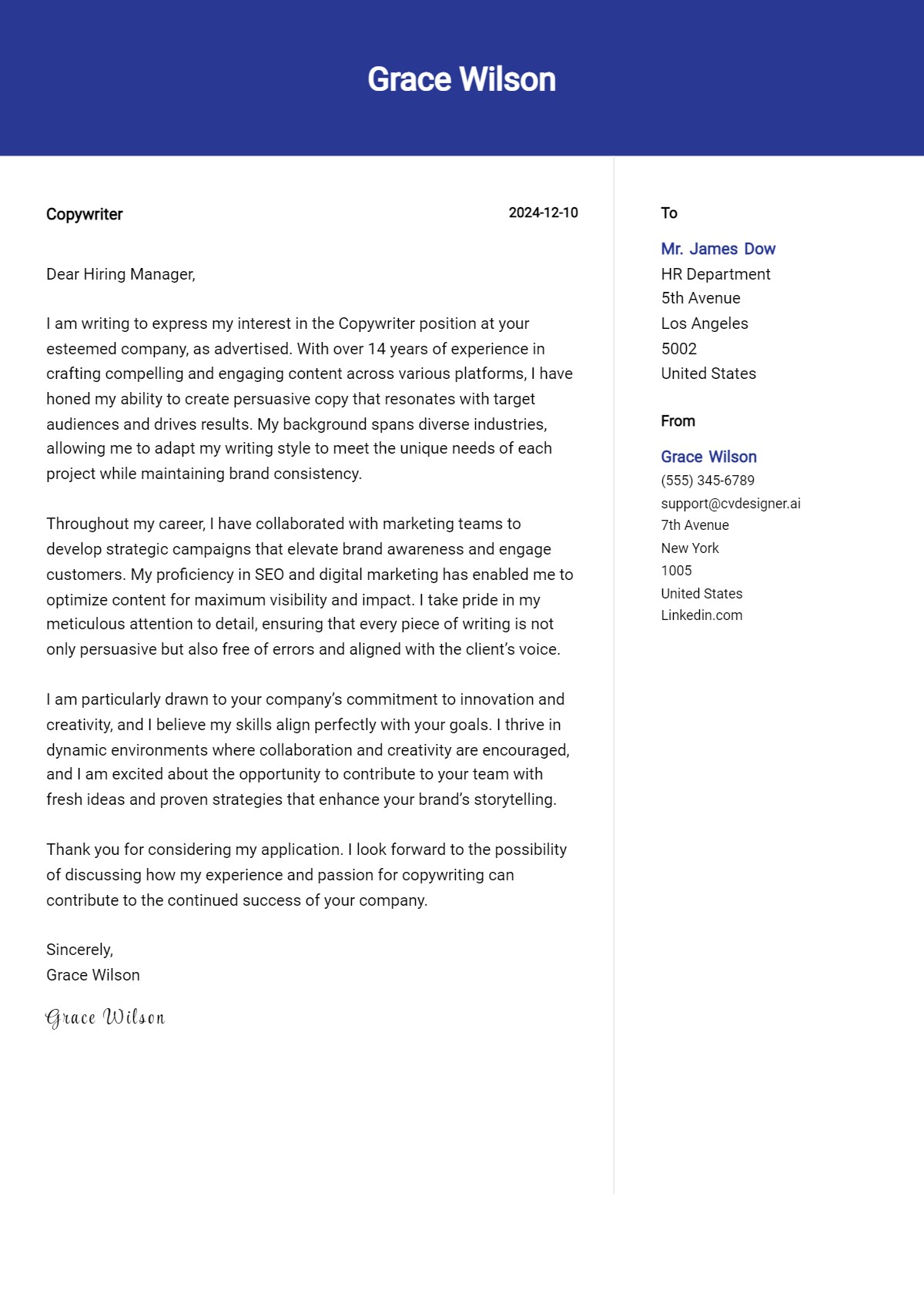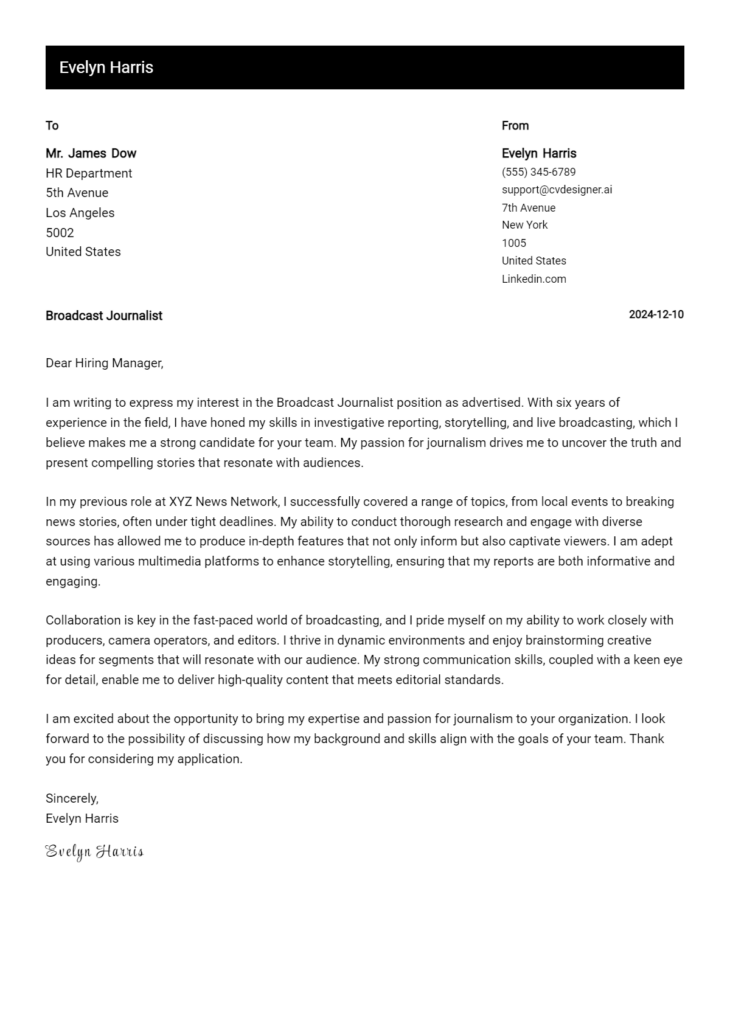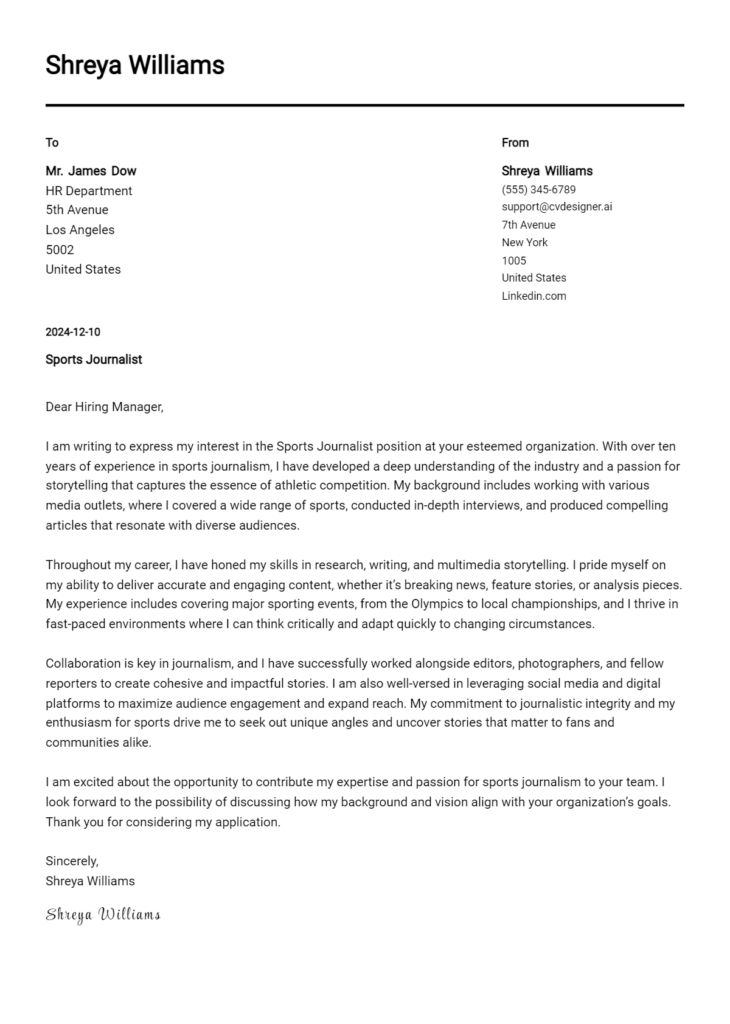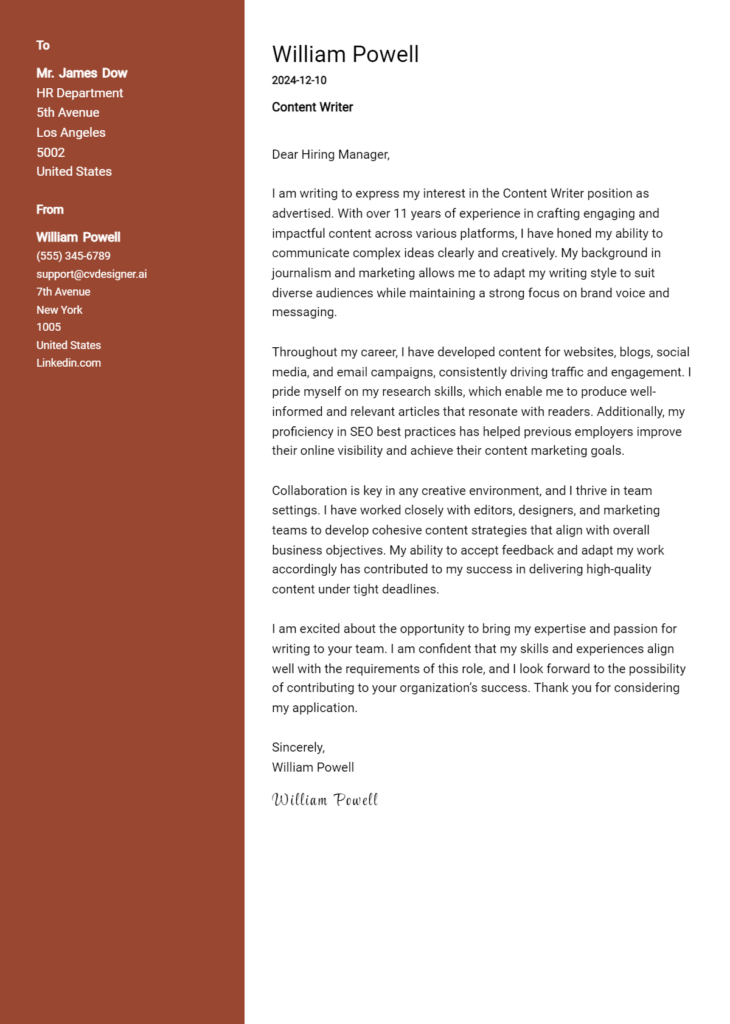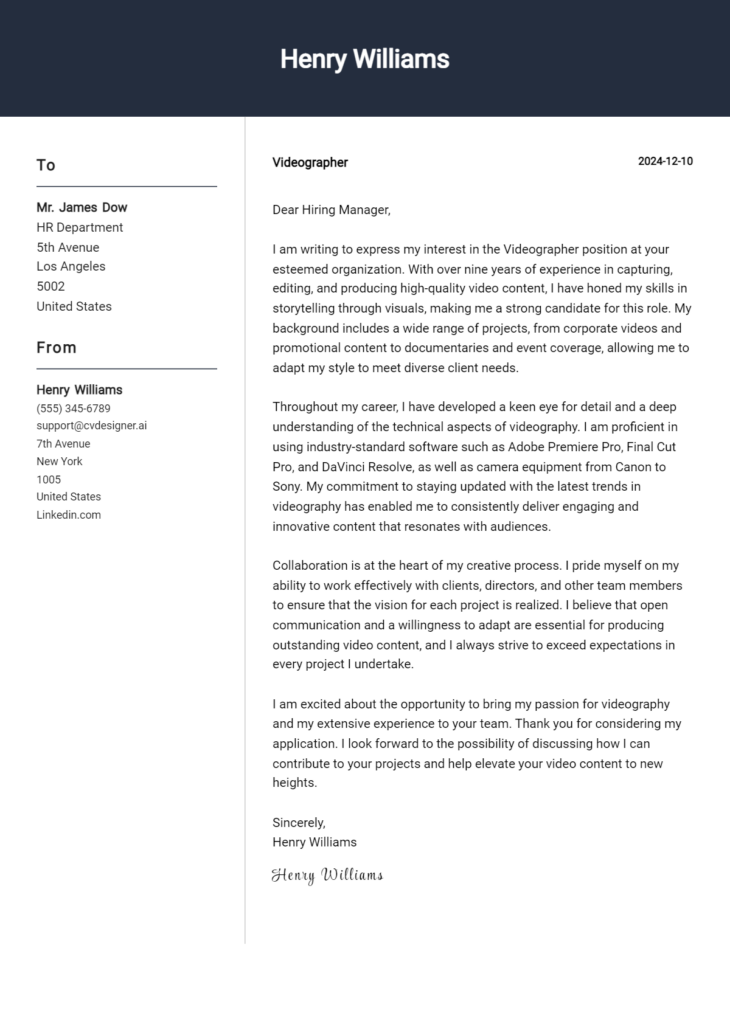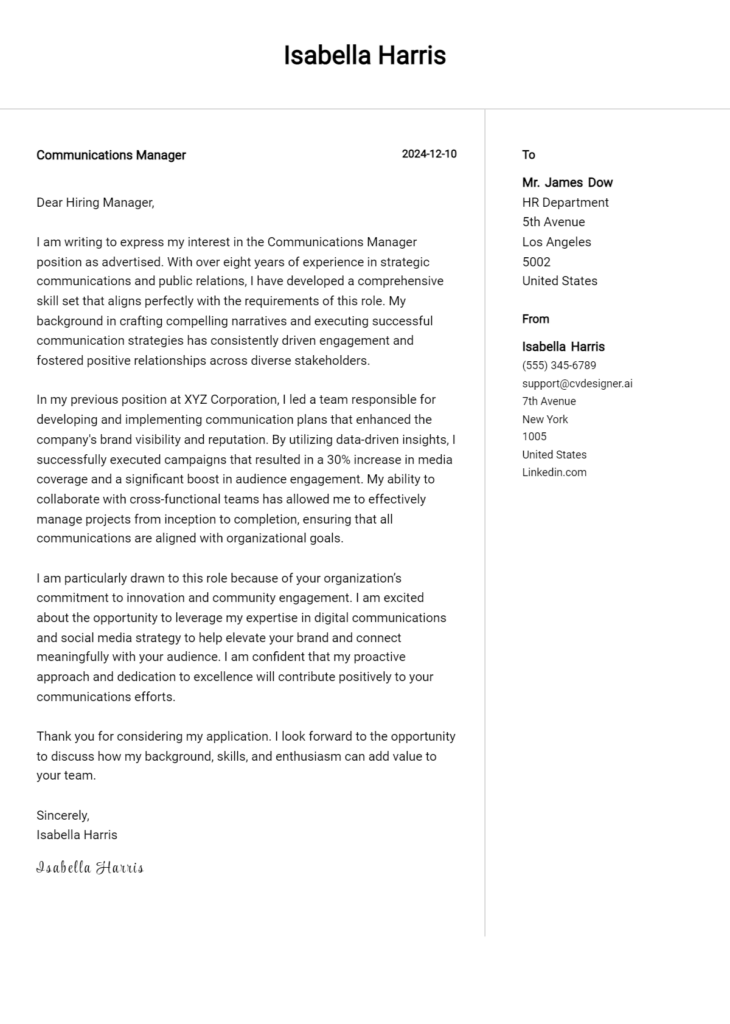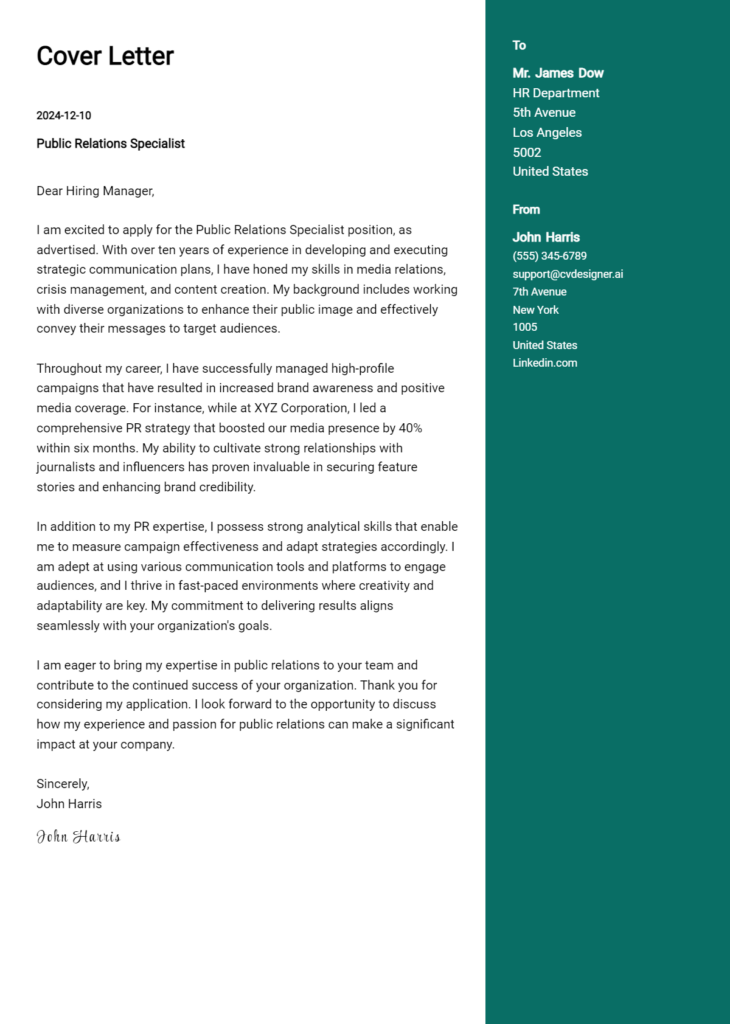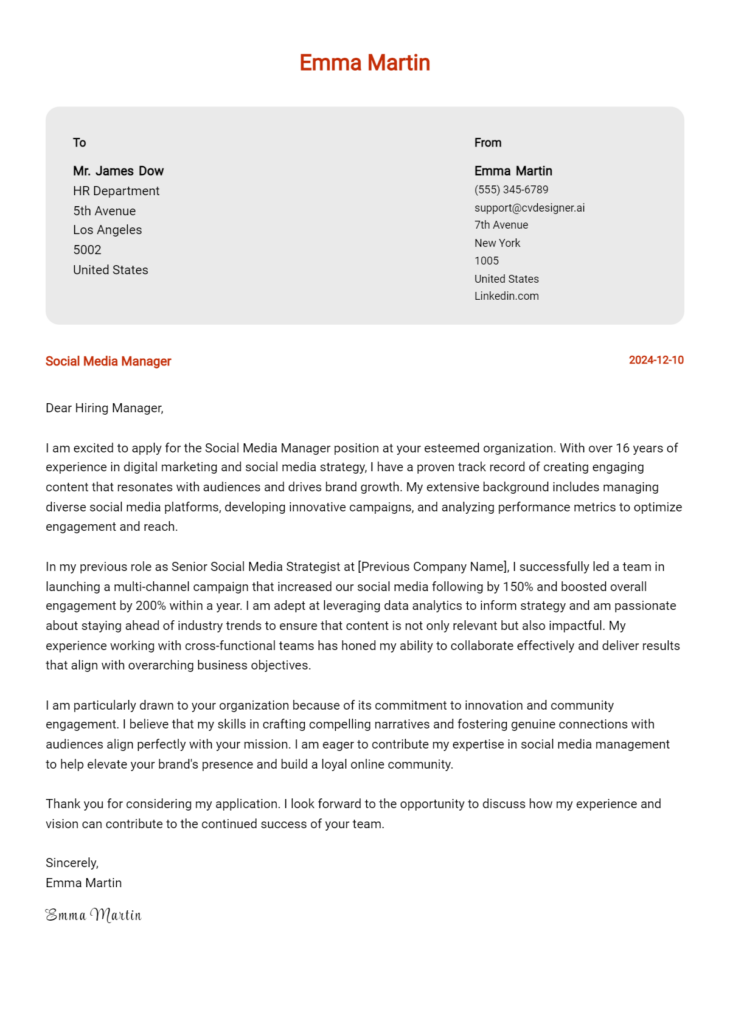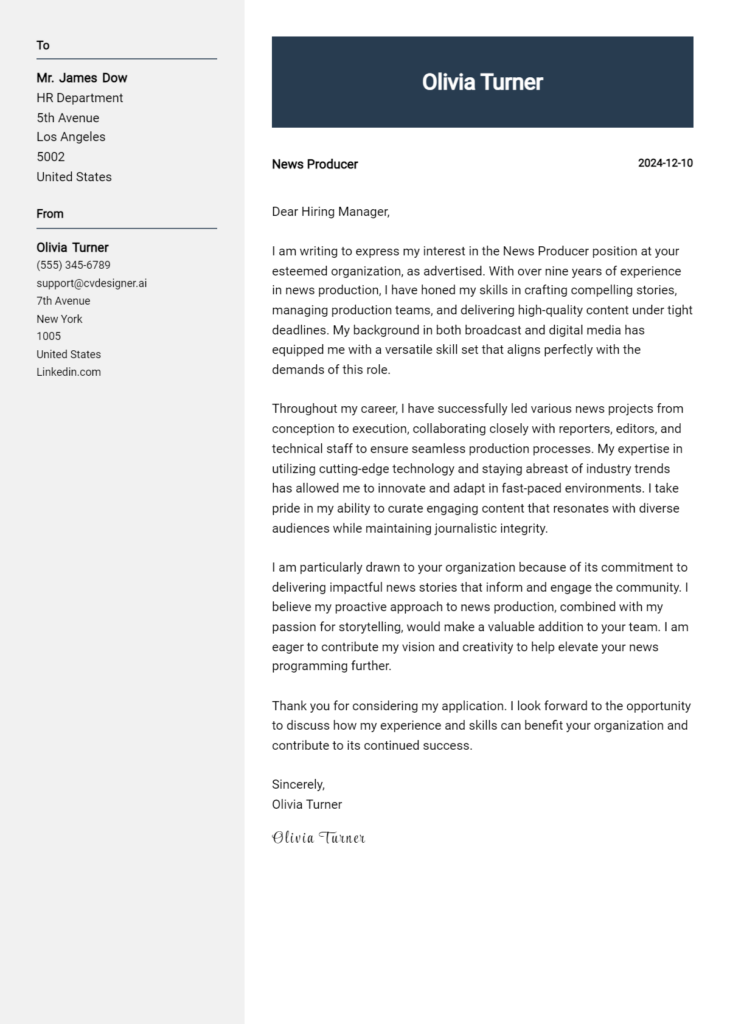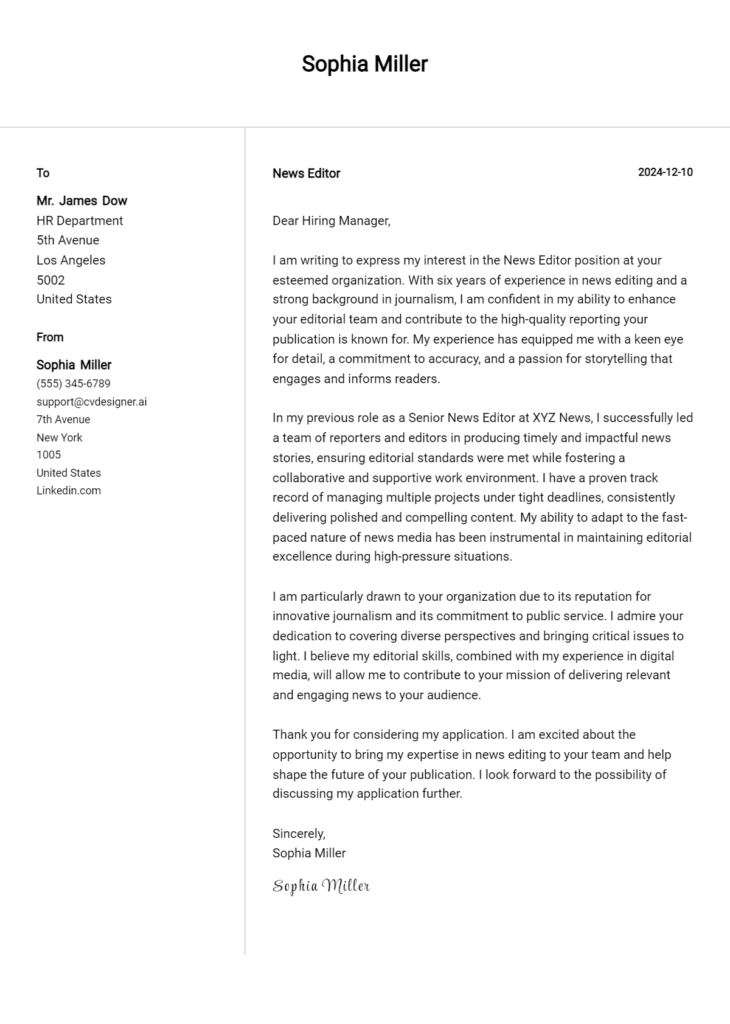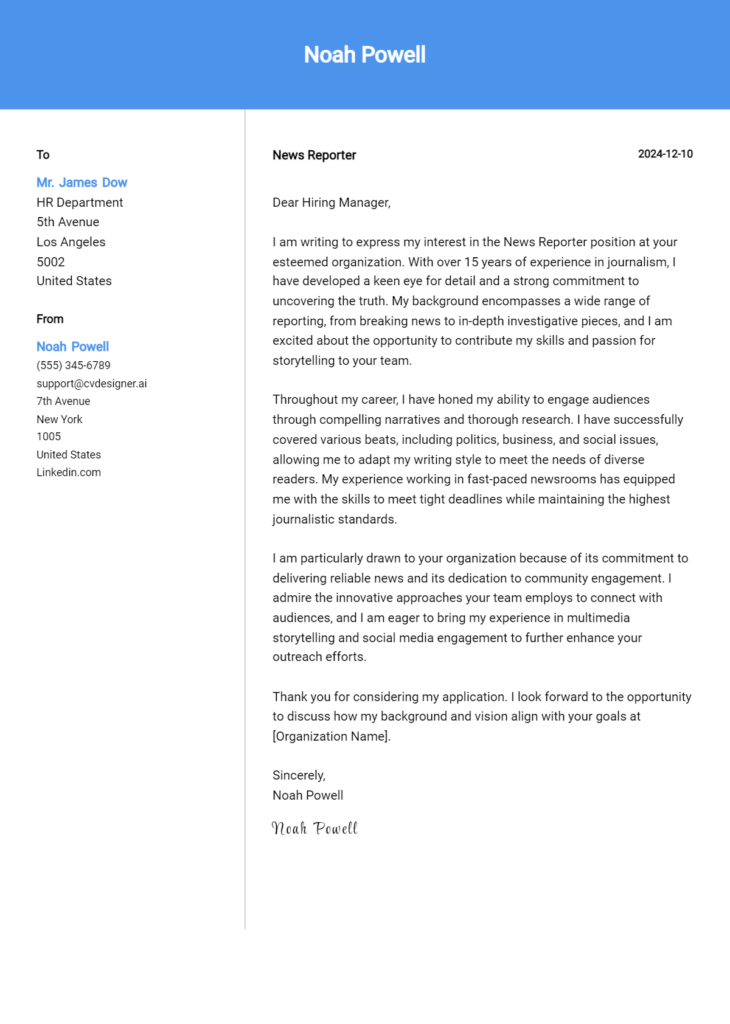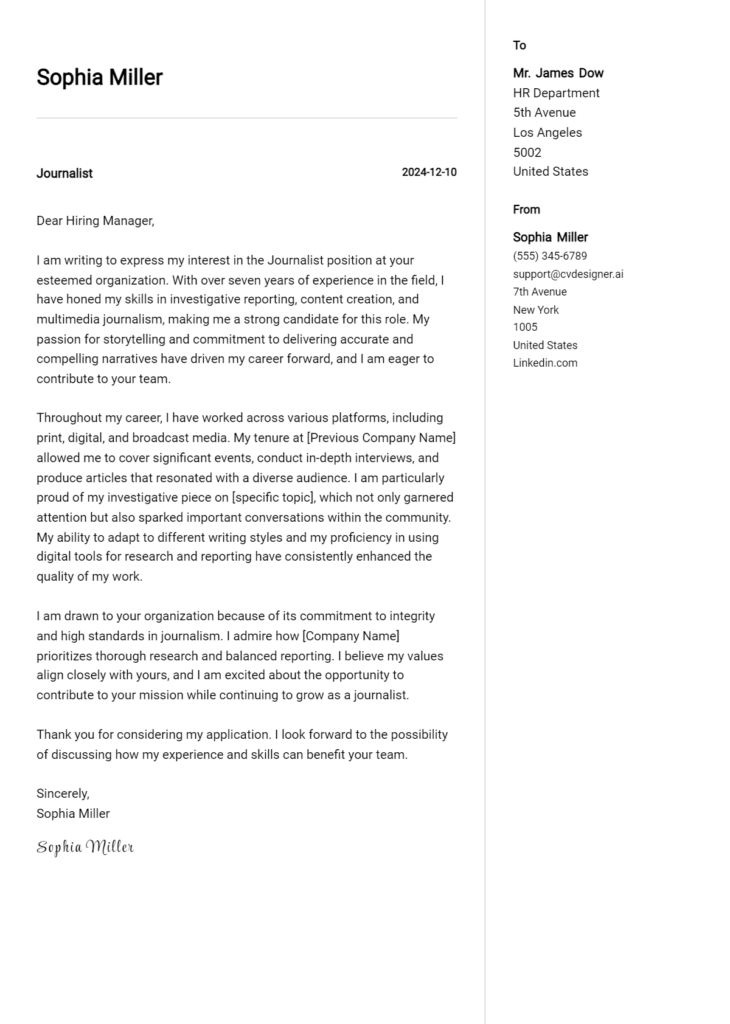Copywriter Cover Letter Examples
Explore additional Copywriter cover letter samples and guides and see what works for your level of experience or role.
How to Format a Copywriter Cover Letter?
In the competitive world of copywriting, your cover letter serves as your first opportunity to showcase not just your skills, but also your creativity and attention to detail. A well-formatted cover letter can set you apart from other candidates, as it reflects your ability to communicate effectively and engage your audience. The structure and presentation of your cover letter are paramount; they demonstrate your understanding of the importance of clarity and persuasion—essential elements in the copywriting profession.
In this guide, we will delve into the key components of a professional copywriter cover letter, providing you with strategies and examples to help you craft a document that makes a lasting impression.
We’ll cover the essential sections of a cover letter, including:
- Cover Letter Header
- Cover Letter Greeting
- Cover Letter Introduction
- Cover Letter Body
- Cover Letter Closing
Each section is crucial for effectively presenting your qualifications while showcasing your unique voice and style. Let’s explore each part to help your copywriter cover letter shine.
Importance of the Cover Letter Header for a Copywriter
The cover letter header is a crucial element that sets the tone for your application as a Copywriter. It provides essential information that allows the recipient to easily identify who you are and how to contact you. A well-structured header should include your contact information, the date, and the recipient's details, ensuring clarity and professionalism right from the start. This initial impression can significantly impact how your application is perceived, making it vital to present yourself in a polished manner.
A strong header communicates your attention to detail and respect for the hiring process, while a weak header might convey a lack of professionalism or care in your application. Here are examples of both:
Strong Example
Jane Doe 123 Copywriter Lane New York, NY 10001 jane.doe@email.com (555) 123-4567 October 5, 2023 Hiring Manager Creative Agency 456 Marketing Blvd New York, NY 10002
Weak Example
jane doe email: janedoe@gmail.com 10/5/2023 hey, creative agency
The Importance of the Cover Letter Greeting
The greeting of a cover letter plays a crucial role in establishing the tone for the rest of your application. A well-crafted greeting not only demonstrates professionalism but also shows that you have taken the time to personalize your message by addressing the hiring manager directly. This personal touch can set you apart from other candidates who might resort to generic salutations. To make a strong impression, it's essential to avoid impersonal greetings like "To Whom It May Concern" or "Dear Hiring Manager." Instead, take the initiative to research the name of the hiring manager or recruiter, which can often be found on the company’s website or LinkedIn. A thoughtful greeting can convey your enthusiasm for the position and reflect your commitment to the application process.
Strong Greeting Example
Dear Ms. Johnson,
Weak Greeting Example
To Whom It May Concern,
The Importance of a Well-Crafted Cover Letter Introduction for a Copywriter
A compelling cover letter introduction is crucial for any aspiring copywriter, as it serves as the first impression for the hiring manager. This brief yet impactful paragraph should not only grab attention but also convey genuine interest in the position. By highlighting key skills or notable achievements early on, candidates can effectively set the tone for the rest of their cover letter, illustrating their suitability for the role. A strong introduction can distinguish a candidate in a competitive field, while a weak opening may lead to missed opportunities. Below are examples of both strong and weak cover letter introductions for a copywriter position.
Strong Example
Dear [Hiring Manager's Name], As a passionate copywriter with over five years of experience crafting compelling narratives for brands such as [Brand Names], I was thrilled to discover the opening at [Company Name]. My ability to blend creativity with data-driven insights has led to a 30% increase in engagement for my previous clients. I am excited about the opportunity to contribute my unique skills to your team and help elevate [Company Name]'s brand voice even further.
Weak Example
To whom it may concern, I am applying for the copywriter position at your company. I have written some articles and think I could do a good job. I hope to hear back from you soon.
Purpose of the Cover Letter Body for a Copywriter
The cover letter body for a Copywriter serves as a critical platform for candidates to articulate their unique skills, relevant experiences, and the potential value they can bring to the company. This section should effectively showcase specific projects or accomplishments that not only highlight the candidate's writing prowess but also demonstrate their ability to meet client needs and drive engagement. A well-crafted cover letter body allows a Copywriter to differentiate themselves from other applicants by providing tangible examples of past successes, such as successful campaigns, increased brand awareness, or enhanced customer engagement metrics. It should convey passion for the craft and a deep understanding of the brand's voice while aligning personal qualifications with the company's goals.
Strong Example
Dear [Hiring Manager's Name], I am excited to apply for the Copywriter position at [Company Name]. In my previous role at [Previous Company], I successfully led a campaign that increased our social media engagement by 150% within three months. By conducting thorough audience research and employing data-driven strategies, I crafted compelling copy that resonated with our target demographic. Additionally, I collaborated with the design team to create visually appealing content that enhanced our overall brand messaging. I am passionate about storytelling and am eager to bring my creativity and strategic thinking to your team, helping [Company Name] connect with its audience in meaningful ways. Sincerely, [Your Name]
Weak Example
Dear [Hiring Manager's Name], I am writing to apply for the Copywriter position at [Company Name]. I think I am a good writer, and I have had some experience in copywriting. I once wrote some blog posts and social media updates for my last job. I believe I could do well at [Company Name] because I like writing. Thank you for considering my application. Best, [Your Name]
Importance of Cover Letter Closing for a Copywriter
The closing paragraph of a cover letter is a crucial component for any copywriter, as it provides an opportunity to succinctly summarize qualifications, reinforce enthusiasm for the position, and prompt the employer to take the next steps, such as reviewing the resume or scheduling an interview. A strong closing leaves a memorable impression, while a weak one may diminish the overall impact of the application.
Strong Example
Thank you for considering my application for the Copywriter position at [Company Name]. With my extensive experience in crafting engaging content that drives results and my passion for storytelling, I am excited about the opportunity to contribute to your team. I look forward to discussing how my skills can align with your goals. Please feel free to reach out to schedule a conversation at your earliest convenience.
Weak Example
I hope you like my letter. I think I would be good at this job. Please look at my resume. Thanks for your time.
Crafting an effective cover letter is essential for aspiring Copywriters looking to make a strong impression on potential employers. A well-written cover letter not only showcases your technical skills but also highlights your problem-solving abilities, knowledge of the Software Development Life Cycle (SDLC), teamwork, and a commitment to continuous learning. Below are some tips to help you create a compelling cover letter that stands out.
Tips for Writing a Copywriter Cover Letter
Highlight Your Technical Skills
Clearly outline your technical skills relevant to copywriting, such as SEO optimization, proficiency in content management systems, or familiarity with analytics tools. Use specific examples to demonstrate how these skills have contributed to successful projects in your previous roles.Showcase Problem-Solving Abilities
Employers value candidates who can think critically and solve problems creatively. Share a specific instance where you faced a challenge in your writing or project management and explain the steps you took to overcome it. This will illustrate your ability to handle real-world situations effectively.Demonstrate Knowledge of SDLC
Understanding the Software Development Life Cycle can be a significant asset for a Copywriter, especially when working on projects involving software or digital products. Briefly mention your familiarity with SDLC phases and how your writing integrates with each stage, showcasing your ability to collaborate with developers and designers.Emphasize Teamwork
Many copywriting projects require collaboration with other departments such as marketing, design, and sales. Highlight your experience working in teams, your communication skills, and how you have successfully contributed to group efforts. This will reassure employers that you can thrive in a collaborative environment.Express a Passion for Continuous Learning
The digital landscape is ever-evolving, and a great Copywriter stays updated with the latest trends and technologies. Mention any relevant courses, workshops, or certifications you’ve completed recently, or express your eagerness to learn new skills. This demonstrates your commitment to professional growth and adaptability.
By implementing these tips, you'll be well on your way to crafting an impressive cover letter. For more assistance, consider using cover letter templates or a cover letter builder to streamline the process and ensure a polished final product.
Common Mistakes to Avoid in a Copywriter Cover Letter
Crafting a compelling cover letter is essential for standing out in the competitive field of copywriting. Avoiding common mistakes can significantly enhance your chances of making a positive impression on potential employers. Here are some frequent pitfalls to watch out for:
Generic Salutations: Using "To Whom It May Concern" can make your letter feel impersonal. Instead, research the hiring manager's name for a personalized touch.
Lack of Specificity: Failing to tailor your cover letter to the job description may signal a lack of interest. Highlight relevant experience and skills that align with the specific position.
Overly Formal Language: A copywriter's voice should reflect creativity and clarity. Avoid stiff language; instead, adopt a conversational tone that showcases your writing style.
Ignoring Format Guidelines: Not adhering to a professional cover letter format can detract from your message. Familiarize yourself with proper formatting to ensure readability and a polished appearance. For more details, check out this cover letter format.
Repetitive Content: Simply reiterating your resume can bore the reader. Use the cover letter to expand on key experiences and share your passion for copywriting.
Neglecting a Call to Action: Failing to include a call to action can leave your letter feeling incomplete. Encourage the reader to contact you for further discussion.
Typos and Grammatical Errors: Mistakes can undermine your credibility as a writer. Always proofread multiple times and consider using tools or a fresh pair of eyes to catch errors.
By steering clear of these common mistakes, you can create a standout cover letter that effectively showcases your skills and enthusiasm for the copywriting role. For inspiration, explore various cover letter examples to find the right tone and structure for your application.
Cover Letter FAQs for Copywriter
What should I include in my cover letter as a copywriter?
In your cover letter, you should begin with a strong introduction that captures the employer's attention. Highlight your relevant experience in copywriting, including specific industries or types of content you’ve worked on, such as digital marketing, advertising, or SEO. Mention your skills in research, creativity, and understanding of brand voice. It's also effective to include a brief anecdote about a successful project or campaign that demonstrates your impact. Lastly, convey your enthusiasm for the role and the company, showing that you've done your homework about their brand and values.
How can I tailor my cover letter for a specific job?
To tailor your cover letter, start by carefully reading the job description and identifying key skills and experiences the employer is seeking. Use these keywords in your letter to align your qualifications with their needs. Research the company’s tone and style—if they prefer a casual voice, reflect that in your writing. Additionally, mention specific projects or achievements that relate directly to the company’s industry or current campaigns. Personalizing your cover letter not only shows your genuine interest in the position but also demonstrates your ability to adapt your writing to different audiences.
Should I include my portfolio in my cover letter?
While it's not necessary to include your entire portfolio in your cover letter, you should definitely mention it. Provide a link to your online portfolio or attach a few relevant samples that showcase your best work, particularly pieces that align with the job you're applying for. This gives the employer immediate access to your writing style and versatility. Make sure to refer to specific pieces in your cover letter that highlight your skills and directly relate to the job description, reinforcing how your experience makes you a strong candidate.
How long should my cover letter be?
A cover letter for a copywriter should ideally be one page long, typically around 300-400 words. This length allows you to provide enough detail about your background and qualifications without overwhelming the reader. Keep your paragraphs concise, focusing on your most relevant experience and skills. Use a clear structure: an engaging introduction, a body that highlights your key achievements and how they relate to the job, and a strong conclusion that reiterates your enthusiasm for the position. Remember, quality over quantity—make every word count!
Build your Cover Letter in minutes
Use an AI-powered cover letter builder and have your letter done in 5 minutes. Just select your template and our software will guide you through the process.

